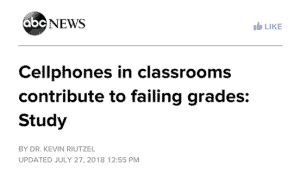Cellphones in the Modern Classroom

by Dan Limmer, BS, NRP
Our articles are read by an automated voice. We offer the option to listen to our articles as soon as they are published to enhance accessibility. Issues? Please let us know using the contact form.
It doesn’t take long in medicine or education to have one promising theory or study contradicted by the most recent. I recall Ivy League schools encouraging students to tweet and post on Facebook from class. The universities said that it helped students express themselves—and allowed educators to see what their students were feeling and experiencing. It wasn’t long before some of those same institutions blocked social media sites from the internet in lecture halls and classrooms. It was a distraction which didn’t justify the benefit.

The headline of a recent paper, widely reported by the media, announces cell phones as a contributor to falling grades. This seems to contradict the belief that electronic devices such as cell phones have a place in the modern classroom.
I’m not sure the verdict is fully in yet.
The paper had a small sample size in an undergraduate psychology setting. The difference in grades between the cell phone users and non-users was only about 5 points. Interesting and worthy research, but not the smoking gun to ban cell phones in all settings—and it doesn’t address tablets and notebook computers.

The one part of the paper I do fully agree with is that there are times when one student using an electronic device of any kind ends up distracting everyone around him or her in class. This is unacceptable. It’s also a valid concept that students may learn better when taking handwritten notes versus on a computer.
Whether cell phones—or any other electronic devices—should be used depends on many factors. Is there an educational need for the device? What is the age and maturity level of your students? Do you—or your school—have policies about devices and do you enforce those policies consistently? What type of classroom do you use: traditional or active? What example do you set with your use of electronic devices?
The Yale Center for Teaching and Learning considers many of these same factors: https://ctl.yale.edu/Using-Electronic-Devices-in-Class
Policies on cell phones in EMS classrooms vary. Some educators require students to place their phones in an inaccessible area while others limit use to emergencies and in-class research. Other radicals (like me) place few restrictions on cell phone use. I am, however, very clear with my students about the consequences. If I see a student doing non-class work on any device during class they lose all opportunities for make-up work to improve a grade in that lesson. Word about this experience travels quickly and usually eliminates any future problems.
As an educator, how much should I have to micromanage student’s behavior? I want to set a bar for appropriate behavior, enforce it consistently, and model it myself. My paramedic students will eventually get keys to the narc box. If I can’t trust them with their phones, the battle may already be lost.
What is your policy on electronic devices? What is your opinion on this research? We’d love to hear what you think.
[1] Arnold L. Glass, Mengxue Kang. Dividing attention in the classroom reduces exam performance.Educational Psychology, 2018
Related articles

Dan Limmer, BS, NRP

Mike Miller


